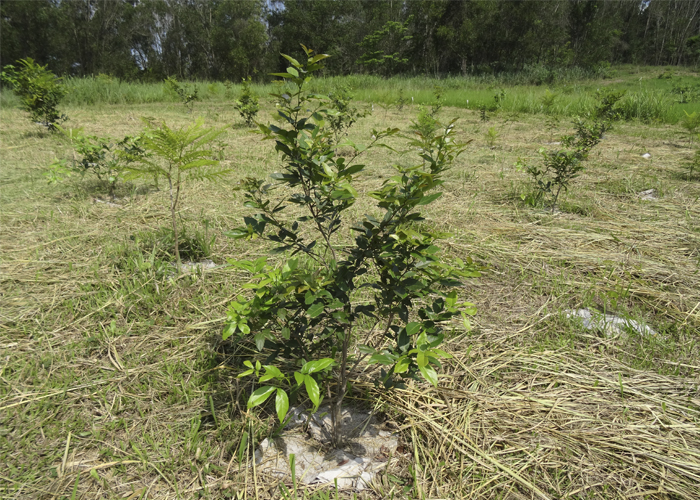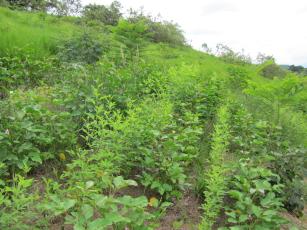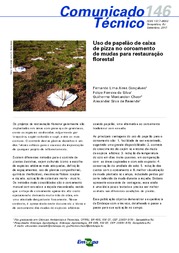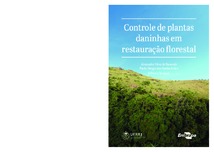Pizza boxes can cheapen reforestation
Pizza boxes can cheapen reforestation
A simple and cheap technique can help the recovery of degraded areas at half the cost of traditional methods. It comprises the use of cardboard to control weeds by crowning (removing weeds by cutting through below their "crown") seedlings in reforestation activities. Growers can even resort to used pizza boxes. Developed by researchers from Embrapa Agrobiology, the technique can make pasture recovery financially possible for smallholders. Brazil today has about 21 million hectares of Permanent Preservation Areas and Legal Reserves that need to be rehabilitated, most of which have been used as pastures.
The method, which has already been used in croplands, is a novelty for reforestation with native species. In forest recomposition projects, most costs are associated with the control of weeds that endanger the seedlings' growth and survival. About two thirds of the investment are destined to control the so-called weed competition. “There are several solutions to the problem. Herbicide is the one most commonly used in agriculture, but not in the environmentally-focused forest sector, mainly because these are areas that are close to water resources”, explains the researcher Alexander Resende.
The technique is simple and uses a new or reused cardboard disk or sheet to protect the ground base of forest plant seedlings in the first years of plantation. The protection hinders the development of the grasses that would compete with the reforestation species. Thus the seedlings grow as if they were under traditional weed control with hoes, scythes or string trimmers. But the traditional method requires too much labour with low operational income, which burdens environmental rehabilitation projects.
The researcher Guillermo Chaer reports that the field experiments demonstrated that, besides preventing the grasses from growing, the cardboard increases the seedlings' survival rate. “From the eleven species assessed, nine showed a survival rate of 80% or over when crowned with cardboard, while only three reached such figure when crowned by handhoeing”, Chaer said.
While it increases seedling survival in the field, the cardboard does not affect plant growth in comparison with manual treatment. In turn, it can reduce soil surface temperatures in up to 10º C in hotter days as well as water loss through evaporation. “That makes a huge difference for the plant, as it relieves both thermal and water stress. By losing less water, the plant benefits”, he comments.
The research analysed cardboard's potential to suppress four grass species that are common in the Atlantic Rainforest: Brachiaria brizantha cv Marandu, Panicum maximum Jacq cv Colonião, Andropogon bicornis and Brachiaria humidicola. In all four cases, the cardboard inhibited their development.
Technique allows the use of pizza boxes
The first field experiments were made with packaging used to transport pizza. The aim is to assess the field durability of the cardboard coated with substances to delay its decomposition rate and thus prolong the grass-suppressing effect. Results have shown that, in field conditions, the cardboard is efficient for over a year if it is soused with a copper sulphate solution.
According to Chaer, copper sulphate reduces the incidence of fungi that decompose the material's lignin, preserving it for longer. “The solution, derived from solutions used to treat wood, is simple to prepare and offers low cost and low toxicity, once it does not use potassium dichromate, which is common in such products”.
To illustrate the savings provided by the technique, in a common crowning made with hoes, farmers spend around R$ 5,800.00 per hectare in the first year after planting the seedlings, considering four crownings throughout the year. But by choosing the crowning with cardboard, the cost falls to R$ 2,800.00. Such calculations were made based on new cardboard packaging bought in retail. If farmers want to lower the cost even more, they can recycle cardboard.
Translation: Mariana de Lima Medeiros
Ana Lucia Ferreira (MTB 16913/RJ)
Embrapa Agrobiology
agrobiologia.imprensa@embrapa.br
Phone number: +55 21 3441-1500
Further information on the topic
Citizen Attention Service (SAC)
www.embrapa.br/contact-us/sac/





